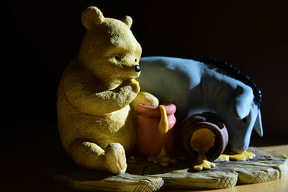|
When someone we love very much dies (or when we have suffered a great loss or stress of any kind), our minds automatically search for a way to cope. Subconsciously or not, as a way to cope with the grief we are feeling, we may revert to some simple comforts of our childhoods. We may watch an old movie we haven’t seen in awhile, flip through some photo albums, or listen to a familiar song that has never failed to calm us down. We may take very long bubble baths or take very long naps. We may even sleep with an old stuffed animal for a few days, if that makes us feel better, and that is totally fine. That tattered old stuffed animal may very well be a Winnie-the-Pooh (wow, smooth bridge there!)
Originally debuted in 1924 by English author A.A. Milne, Winnie-the-Pooh is a lovable storybook teddy bear from almost all of our childhood memories. A creature of classic tale and also of timeless wit, Pooh has captured the imaginations of artists, writers, philosophers, and children alike the world over. Besides in kids’ picture books and TV series, he can be found in publications and media geared toward adults, including Benjamin Hoff’s The Tao of Pooh, John Tyerman Williams’ Pooh and the Philosophers, and most recently Disney’s live-action adaptation Christopher Robin. Children sense a natural kinship with the winsome bear, whose gentle humor and whimsical adventures through the Hundred Acre Wood easily capture their attentions. But Winnie-the-Pooh’s attitude of mindfulness is also one to be desired by grownups, who strive daily to catch a glimpse of his innocent, restful existence in our own often chaotic worlds. Grownups pray, we meditate, we cry, we sleep, but Pooh just is (his go-with-the-flow attitude is in contrast to that of his friend Eeyore, who possesses a more dysthymic melancholy but who is nonetheless accepted just as he is). Much like a child, Pooh is generally content with his life no matter if he feels happy or bothered; he is content in his everlasting state of doing nothing, which he finds joy in: “Don’t underestimate the value of Doing Nothing, of just going along, listening to all the things you can’t hear, and not bothering.” -Pooh Doing Nothing sounds extremely attractive when one’s mind is under the weight of the heavy emotions of grief…when one’s heart is burdened by the memories of a loved one we’ll never see again, at least not for a very long time. For all his simplicity, even Pooh knows how that kind of sadness can feel. When Christopher Robin revealed that he would soon be leaving for the ever-elusive “school,” Pooh did not quite understand what or where exactly that was. He didn’t know what Christopher Robin would be doing all day there, all he knew was that Christopher would not be spending the days with him anymore. Even through his sadness, however, Pooh also knew “how lucky I am to have something that makes saying goodbye so hard.” Winnie-the-Pooh quotes are often featured in eulogies, especially those for young children. If you are searching for the perfect Pooh quote, for a funeral service or just for your own reverie, here are a couple of sites that may be of interest to you: https://www.swanboroughfunerals.com.au/10-funeral-readings-from-winnie-the-pooh/ https://everydaypowerblog.com/winnie-the-pooh-quotes/ -Aubrey
2 Comments
7/9/2019 10:25:22
Luck is a difficult thing to estimate, especially because there is no real metric for it. A person's luck is something that he or she makes. Those who rely on luck alone will never win in life, if you ask me, luck is about doing whatever you can. No matter how lucky you are, if you do make a decision to work hard, then all of that luck is for nothing. I hope that we understand how different elements factor into luck.
Reply
Leave a Reply. |
Archives
May 2024
Categories
All
|


 RSS Feed
RSS Feed
